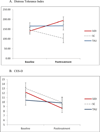Initial RCT of a distress tolerance treatment for individuals with substance use disorders
- PMID: 21983476
- PMCID: PMC3288895
- DOI: 10.1016/j.drugalcdep.2011.09.012
Initial RCT of a distress tolerance treatment for individuals with substance use disorders
Abstract
Background: Psychological distress tolerance, the ability to persist in goal directed activity when experiencing psychological distress, is associated with poor substance use treatment outcomes including drug and alcohol treatment dropout and relapse.
Objective: The current study examines if a brief distress tolerance intervention that was specifically developed as an adjunctive treatment for patients in residential substance abuse treatment shows efficacy in improving the patients' distress tolerance.
Methods: Seventy-six individuals who were receiving treatment at a residential substance use treatment facility and indexed low distress tolerance on laboratory distress tolerance measures were randomized into three conditions: treatment-as-usual (TAU), six sessions of Supportive Counseling (SC), or six sessions of the novel distress tolerance treatment, Skills for Improving Distress Intolerance (SIDI).
Measures: Patients were assessed at baseline for DSM-IV psychiatric diagnoses, DSM-IV substance use disorders, distress tolerance, and depressive symptoms. Patients were again assessed at posttreatment. Therapeutic alliance and treatment expectancies and credibility were also assessed at posttreatment.
Results: Patients who received SIDI (n=28) evidenced significantly greater improvements than SC (n=24) and TAU participants (n=24) on the distress tolerance laboratory measures, even when controlling for changes in negative affect (in the form of depression). Additionally, a higher percentage of patients in SIDI reached clinically significant improvement compared to patients in SC and TAU.
Conclusion: This study supports the efficacy of SIDI in improving distress tolerance levels among individuals with drug and alcohol use disorders currently receiving residential substance use treatment. SIDI appears to be a brief and feasible intervention for use within inpatient substance use facilities.
Copyright © 2011 Elsevier Ireland Ltd. All rights reserved.
Conflict of interest statement
All authors declare that they have no conflicts of interest.
Figures


References
-
- Andrews G. The essential psychotherapies. Br. J. Psychiatry. 1993;162:447–451. - PubMed
-
- Anestis MD, Selby EA, Fink EL, Joiner TE. The multifaceted role of distress tolerance in dysregulated eating behaviors. Int. J. Eat. Disord. 2007;40:718–726. - PubMed
-
- Bornovalova MA, Gratz KL, Daughters SB, Nick B, Delany-Brumsey A, Lynch TR, Kosson D, Lejuez CW. A multimodal assessment of the relationship between emotion dysregulation and borderline personality disorder among inner-city substance users in residential treatment. J. Psychiatr. Res. 2008;42:717–726. - PubMed
-
- Brandon TH, Herzog TA, Juliano LM, Irvin JE, Lazev AB, Simmons VN. Pretreatment task persistence predicts smoking cessation outcome. J. Abnorm. Psychol. 2003;112:448–456. - PubMed

